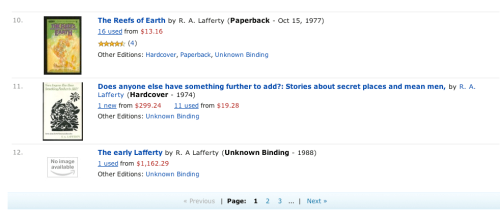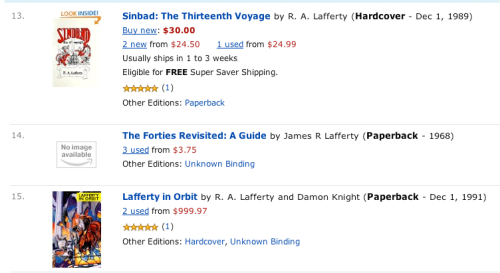I came across yet another list of the “100 science fiction books everyone should read.” Like every other one I’ve seen, it’s an arbitrary selection and not at all what I would have chosen (though it does earn a point for mentioning The Fifth Head of Cerberus.) Rather than reprint that list here with the usual “bold what you’ve read,” I instead compiled my own. It’s half the length of the other and perhaps just as arbitrary, but I daresay it’s better reading.
A lot of writers you might have expected are missing. In some cases it’s because I haven’t read them yet, but usually it’s deliberate. For instance, I have no desire to re-read anything by Isaac Asimov no matter how historically important he may be, so why include The Foundation Trilogy? (And I think John Sladek is more reliable on the Three Laws of Robish, anyway.)
There are a lot of short story collections mentioned. Partly it’s because I like short stories, but mainly it’s because many writers are better at shorter lengths.
I could easily have made a valid list using just the works of Wolfe, Wells, Lafferty and Dick, but I’ll leave that as an exercise for the obsessive.
Douglas Adams, The Hitchhiker’s Guide to the Galaxy: the Original Radio Scripts
J.G. Ballard, Chronopolis
Greg Benford, Timescape
Alfred Bester, The Stars My Destination, Starburst
Ray Bradbury, The Martian Chronicles
Algis Budrys, Rogue Moon
Anthony Burgess, A Clockwork Orange
Arthur C. Clarke, Childhood’s End
Samuel Delany, Driftglass
Philip K. Dick, The Man in the High Castle, The Preserving Machine, or any other of his better novels or short story collections
Thomas M. Disch, Fun with Your New Head, Camp Concentration
William Gibson, Neuromancer
Aldous Huxley, Brave New World
Diana Wynne Jones, A Tale of Time City
C.M. Kornbluth, The Best of C.M. Kornbluth
Frederick Pohl & C.M. Kornbluth, The Space Merchants
Henry Kuttner, The Best of Henry Kuttner
R.A. Lafferty, Nine Hundred Grandmothers, or any other collection of his short stories ((If you need evidence that there is something fundamentally wrong with the publishing industry, note that The Collected Stories of R.A. Lafferty still doesn’t exist.))
Ursula K. Le Guin, The Wind’s Twelve Quarters
Stanislaw Lem, Solaris, The Cyberiad
Barry Malzberg, The Best of Barry N. Malzberg, or whatever else you can find ((It is not required to read a lot of Malzberg; a brief glimpse of his universe will suffice for most readers.))
Walter M. Miller, Jr., A Canticle for Liebowitz
George Orwell, 1984
Frederick Pohl, The Best of Frederick Pohl
Rudy Rucker, Master of Space and Time, or any collection with Harry Gerber stories
Joanna Russ, The Adventures of Alyx, And Chaos Died
Mary Doria Russell, The Sparrow
Robert Sheckley, Dimension of Miracles, or any collection of his short stories
Keiichi Sigsawa, Kino no Tabi ((Good luck finding this one. The contract to publish the Kino stories in English fell through shortly after the first volume was printed. You can get a taste of Sigsawa’s work by watching the animated series Kino’s Journey, which heads my short list of anime for people who think they hate anime.))
John Sladek, Tik-Tok, Mechasm
Cordwainer Smith, The Rediscovery of Man
Olaf Stapledon, Star Maker
Neal Stephenson, The Diamond Age
William Tenn, Immodest Proposals, or any other collection of his short stories
James Tiptree, Jr., Ten Thousand Light Years from Home, or any other collection of her short stories
Yasutaka Tsutsui, Salmonella Men on Planet Porno
Jack Vance, The Dying Earth
Kurt Vonnegut, The Sirens of Titan
Ian Watson, The Very Slow Time Machine, or any of his early novels
H.G. Wells, The Island of Dr. Moreau
Gene Wolfe, The Island of Dr. Death and Other Stories and Other Stories, The Book of the New Sun
John C. Wright, The Golden Age trilogy
Yevgeny Zamyatin, We







